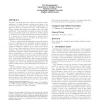Free Online Productivity Tools
i2Speak
i2Symbol
i2OCR
iTex2Img
iWeb2Print
iWeb2Shot
i2Type
iPdf2Split
iPdf2Merge
i2Bopomofo
i2Arabic
i2Style
i2Image
i2PDF
iLatex2Rtf
Sci2ools
124
click to vote
STOC
2009
ACM
2009
ACM
Intrinsic robustness of the price of anarchy
The price of anarchy (POA) is a worst-case measure of the inefficiency of selfish behavior, defined as the ratio of the objective function value of a worst Nash equilibrium of a game and that of an optimal outcome. This measure implicitly assumes that players successfully reach some Nash equilibrium. This drawback motivates the search for inefficiency bounds that apply more generally to weaker notions of equilibria, such as mixed Nash and correlated equilibria; or to sequences of outcomes generated by natural experimentation strategies, such as successive best responses or simultaneous regret-minimization. We prove a general and fundamental connection between the price of anarchy and its seemingly stronger relatives in classes of games with a sum objective. First, we identify a "canonical sufficient condition" for an upper bound of the POA for pure Nash equilibria, which we call a smoothness argument. Second, we show that every bound derived via a smoothness argument extends...
| Added | 23 Nov 2009 |
| Updated | 23 Nov 2009 |
| Type | Conference |
| Year | 2009 |
| Where | STOC |
| Authors | Tim Roughgarden |
Comments (0)

